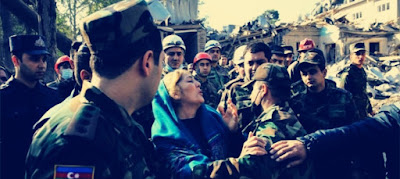The decades-long Nagorno-Karabakh conflict between Azerbaijan and Armenia has not abated. Despite Russia's mediation efforts, the two countries have been fighting for control of the region since the 1990s, and the conflict has intensified in recent weeks.
Azerbaijan Armenia conflict Azerbaijan says Nagorno-Karabakh has been recognized internationally as part of Azerbaijan and regaining control of it is tantamount to completing an unfinished business. Armenia, on the other hand, maintains that Nogorno Karabakh has historically been the home of Armenians and has been part of Armenia for centuries.
The BBC's Orla Guerin and Steve Rosenberg have seen the bitterness and patriotism of citizens of both countries in the tense region.
BBC News, Azerbaijan.

There are tears on both sides of the main road in Ganeji, Azerbaijan's second largest city, the upper part of which is bathed in the morning sun. Pieces of broken glass are scattered on the street as if there were glass carpets on the street. Behind this street are many residential and commercial buildings that look like cracked tin cans.
The city of Guinea is located 100 kilometers (62 miles) from the front of Nogorno-Karabakh. Last Sunday was the first day of a full day of uncertain ceasefire.
Read more :Travelogue of Azerbaijan: Azeri Palau, Nagorno-Karabakh and Kashmir
Azerbaijan has accused Armenia of firing ballistic missiles at residential areas of the city of Guinea, while Armenia has accused Azerbaijan of shelling its urban areas.
We met 60-year-old Noshaba Heidrova, who was wearing a head scarf. His arms were paralyzed with shock.
"We ran in the same condition, in the same clothes we were in," She said. We are children. It was scary. "
We made our way to their rubble house and reached their bedroom where their grandchildren were dreaming. The children suffered minor injuries. Now a new generation on both sides is embroiled in the decades-long conflict."Armenia should leave peacefully," he said. We do not want war. We just want to liberate our country. "
People here consider Nagorno-Karabakh to be a lost part of their country. While this is part of their beliefs, it has been well-received as a national statement and has the support of the international community.
Ihtiyar Rasulov, 22, of Azerbaijan, has never set foot in the Nagorno-Karabakh region, but the young man says he is willing to give his life to get it back.
When we met him in Baku, the capital of Azerbaijan, he had just signed up to take part in the latest war.
"I am ready to fight for my nation and my motherland with my life and my blood," he said sincerely. My father, my mother and my grandparents lived in these areas. My brother is still fighting for Azerbaijan in the ongoing war.
Ihtiyar lives in a housing complex where fleeing families from Nagorno-Karabakh and surrounding areas have taken refuge. These people were forced to flee as a result of the war in the early 1990s. They have been brought up on the lost land, the historical enmity with Armenia and the folklore of their atrocities. It's part of their life and that's what most people here do.
"Karabakh is Azerbaijan," he said. The Armenians came there and they treated our nation very badly. Of course I haven't seen it myself, but I've heard a lot about it. "
He also said that he agrees with the words of Azerbaijani President Ilham Aliyev. In tightly controlled countries where the presidency is passed from father to son, this kind of talk is common.
A neighbor of Ihtiyar came running to show me his old military ID card. Asif Haqvardyev had participated in the earlier battle of Nogorno-Karabakh. They no longer have hair on their heads but they are still passionate and agile.
"I am now 51 years old and I am still ready to fight and die for my country," he said.
I have sent my son to fight in the war. He is fighting on the border. Even if my family dies and they all die, we are not ready to give even an inch of our land.
We received the same message from a grandmother from the frontier city of Tartar. Despite constant shelling from both sides, Ibenez Jafrava has refused to leave her home and now lives in the basement of her house.
We met with several of his relatives in a makeshift shelter. They include her six-month-old grandson, Farz, whom she carried in her arms and was swinging.
"We've been waiting for this for 28 years," he told me, smiling brightly.
"We are very excited about what is happening. My son and daughter are fighting on the front. We are waiting for the day of victory and are staying in temporary shelters to relocate to our homeland.
No one here expects a Russian-mediated ceasefire to last, and the fact is that many do not want a ceasefire at all. His forces have already recaptured some areas of Nagorno-Karabakh. They want victory on the battlefield and they want their president to stand his ground.








0 Comments